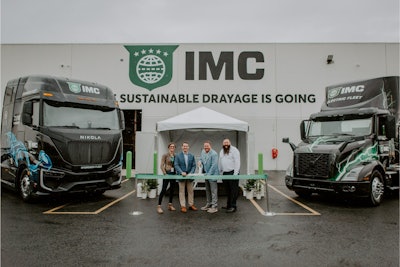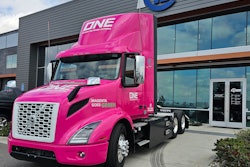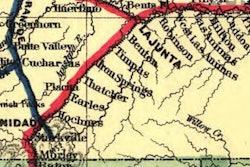Trucking news and briefs for Monday, March 11, 2024:
IMC unveils truck charging station, announces hydrogen-fuel-cell truck purchases
 Ribbon cutting at the IMC Sustainability Open House with Tesi Bravo, Deputy Director, EnergIIZE/Calstart; IMC Chief Executive Officer Joel Henry; IMC Pacific Region President Jim Gillis; and IMC Pacific Region Executive Vice President Michael Stanley.
Ribbon cutting at the IMC Sustainability Open House with Tesi Bravo, Deputy Director, EnergIIZE/Calstart; IMC Chief Executive Officer Joel Henry; IMC Pacific Region President Jim Gillis; and IMC Pacific Region Executive Vice President Michael Stanley.
IMC Logistics (CCJ Top 250, No. 53) announced a significant investment in sustainability at a special event in Compton, California, on Wednesday, March 6.
There, IMC unveiled state-of-the-art electric vehicle charging stations and announced the recent purchase of 50 Nikola hydrogen fuel cell trucks as part of the company's dedication to a greener future in drayage.
The new hydrogen trucks in IMC's fleet will enable the company to leverage the vehicles' 500-mile range to service customers with sustainable drayage in a larger service area. The company already has Volvo electric trucks as part of their fleet.
The new Freewire electric charging stations will allow IMC drivers to charge their trucks on-site, enabling them to provide reliable service to customers while reducing the company's overall carbon footprint.
"At IMC, we believe in the power of sustainable drayage to drive positive change for the environment,” said IMC Pacific Region President Jim Gillis. “Our blended approach to investing in both electric and hydrogen gives us the best of both technologies. We're proud to lead the charge in sustainable drayage solutions."
The March 6 event, organized by IMC, brought together industry and supply chain experts, sustainability advocates, and local community leaders to unveil IMC's latest innovation in its commitment to sustainability while fostering collaboration in pursuit of a cleaner environment.
IMC also announced the opening of a new facility at 15036 and 14978 Ceres Avenue in Fontana, California. This eight-acre facility is equipped with high amperage service, allowing the development of 30 electric charging stations on-site. This site will be instrumental to IMC's goal of zero-emission vehicle deployment in the Inland Empire of California, the company said.
[Related: IMC expands in California with acquisition of American Pacific Transportation]
OOIDA requests more time to comment on FMCSA studies
The comment periods for two information requests from the Federal Motor Carrier Safety Administration are winding down.
One comment period, which is set to close Monday, March 11, involves a planned FMCSA study to understand and quantify the prevalence and severity of sexual assault and sexual harassment (SASH) experienced across the trucking and bus industries, particularly among drivers. FMCSA asked for information on how best to design and conduct the study to identify, categorize and assess context and trends. Comments can be filed here.
The Owner-Operator Independent Drivers Association, in a joint letter with Women in Trucking, asked for an extension of the comment period for an additional 30 days in order to provide “more comprehensive feedback from drivers, industry stakeholders, and other organizations who may have recommendations and insights about how this SASH study can best be organized and conducted.”
Extending the comment period, the groups said, would also give the agency an opportunity to hear from drivers during the Mid-America Trucking Show, March 21-23, in Louisville, Kentucky.
As of March 8, only 10 comments have been filed on the docket.
OOIDA also requested more time for stakeholders to comment on FMCSA’s request for driver input about truck leasing arrangements they have personally experienced or of which they have knowledge. The comment period is set to close Monday, March 18. Comments can be filed here.
OOIDA asked for an additional 30 days to comment “in order to provide [the Truck Leasing Task Force] as much as data possible. This will give drivers and other members of the public sufficient time to collect and submit leasing information.”
In the days following OOIDA’s request, FMCSA announced the TLTF will host a public session at the Mid-America Trucking Show on Thursday, March 21, with time allotted for MATS attendees to speak to the task force.
2024 updates to out-of-service criteria now available
The 2024 Commercial Vehicle Safety Alliance (CVSA) North American Standard Out-of-Service Criteria (OOSC), which take effect on April 1, are now available for purchase through the CVSA Out-of-Service Criteria app and in other formats.
There are 11 changes to the 2024 OOS Criteria. Some notable changes include:
- Amendments to the 20% defective brakes out-of-service condition.
- A clarification that lights not being turned on when a truck is going down the road and not being inspected does not constitute an OOS condition.
- Differentiation in OOS terms between leaks in the tread area of a tire equipped with an automatic tire inflation system (ATIS) versus a tire without ATIS.
The out-of-service criteria app may be accessed anywhere, anytime via a mobile device. In addition to the out-of-service criteria, the app also contains inspection bulletins, photos of violations, inspection procedures, operational policies, access to the CVSA Learning portal and more.
To purchase the new out-of-service criteria, search “CVSA” in the App Store or Google Play then select “CVSA Out-of-Service Criteria.” Once you’ve downloaded the app, set up your account with your first and last name and email address, then purchase the 2024 criteria. If you already have the app, search and select “CVSA Out-of-Service Criteria” in the App Store or Google Play to update your app and purchase the 2024 criteria. All OOS changes for the year are outlined in the PDF at this link. The handbook is $24.99 in the app.
In addition, for the first time, bulk orders of the app are available for jurisdictions and motor carriers. Contact CVSA to place a bulk order.
The app is just one of several ways you may access the criteria. The out-of-service criteria are also available as a spiral-bound handbook ($50), in an electronic format as a restricted PDF ($50), and as an 8.5” x 11” document in French ($75), Spanish ($75), and bilingual English-French ($100) and English-Spanish ($100).












